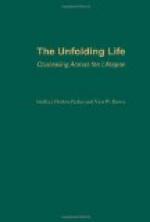The physiologist tells us that it would be hard to find many important points beyond the most fundamental laws in which the infant and the adult exactly resemble each other. (Oppenheim.) In bodily proportions, in actual composition of bones, muscles, blood and nerves, in size and development of the organs, the differences are wide.
The psychologist proves that there is equal variance in mental conditions. The man has a sense of responsibility to his neighbor and to God, unknown to child life. He thinks and reasons and judges as the child mind can not. His whole outlook upon life is opposite from that of the child.
We recognize this difference in caring for the body, and the babe is fed on milk and the boy on meat. But the difference must be recognized as equally important in caring for the soul. Just as meat is meat, whether minced or uncut, and therefore unsuited for a tiny life, so doctrine is doctrine, whether stated in words of one syllable or four, and equally unsuited to a beginning life. Paul refers to those who need milk and not solid food, spiritually, because they are “without experience of the word of righteousness,” clearly indicating a difference in the kind of instruction, not the amount. The subject matter must be adapted to the life, not merely the number of syllables, the method of teaching, as well as the length of the lesson. Without this careful adaptation of food and method, the developing life will be under-nourished, and the most vigorous maturity be impossible.
But these negative statements only safeguard against mistakes by telling us what to avoid. A real working basis must be found in a positive principle.
The study of an unfolding life at any time in its development always reveals two supreme facts, possibilities peculiar to that period, and self activity. The First Principle of development combines these two facts and gives us our nearest approach to a definition.
“Life is a bundle of possibilities and self activity.”
The block of marble has possibilities, so has molten metal and a tube of paint; but life has possibilities plus inner power. The three imperative “Oughts” for the parent or teacher are herein suggested.
First, he ought to be able to recognize each possibility as it appears.
Second, he ought to know how best to deal with it.
Third, he ought to know how to stimulate the activity to greatest endeavor.
II. The Second Principle states the relation of nurture to the unfolding of these possibilities.
“The direction and degree of development are largely determined by nurture.”
Every possibility in a life, unless it die out, must develop either upward or downward, toward the best or worst. This development, whether in a plant or a boy, depends on what is given the life to work with and the use that is made of it, or, stated in more dignified terms—the development is a result of influences that come to a life and the response made to them by activity. The sort of influences and the sort of response given will determine the sort of development. When some one is consciously endeavoring to make both outer influences and the inner working of the life the best possible, it is called nurture.




